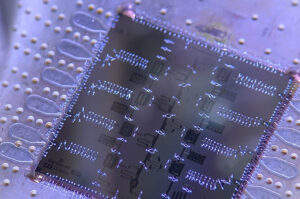
Quantum computing is a large-scale challenge that requires the contributions of all sectors — government agencies, research institutions, and the private sector. At Berkeley Lab, quantum computing researchers are collaborating with partners around the world to advance the field. For example, the Quantum Systems Accelerator (QSA) is a DOE National Quantum Information Science Research Center led by Berkeley Lab with Sandia National Laboratories as lead partner. It assembles talent from 15 member institutions in North America to co-design the algorithms, quantum devices, and engineering solutions needed for quantum computing. And the Advanced Quantum Testbed (AQT), the Lab’s advanced superconducting platform for full-stack quantum computing, fosters deep research collaborations with users, offering access to valuable technology and expertise.
Given the high level of commercial activity in quantum computing research, industry collaborations are also important to the Lab, offering benefits to all parties.
Mutually Beneficial Collaborations
For example, AQT collaborations have resulted in important research advances while supporting the development of valuable tools for the broader quantum computing industry. The AQT team collaborated with the startup Quantum Benchmark (acquired by Keysight Technologies) to improve the reliability of quantum processor performance. It’s extremely difficult to measure and mitigate the range of errors that accumulate when operating these noise-sensitive technologies. Furthermore, it is challenging to test a quantum processor’s performance with increasing qubits required for complex operations. To address these challenges, Quantum Benchmark and AQT staff built on a randomized compiling (RC) protocol, which was tested on an AQT quantum processor. The experiment, described in a jointly authored paper in Physical Review X, showed that RC enables accurate predictions of algorithm performance from measured qubit error rates. In fact, the product proved so useful that AQT is now using it.
AQT’s work with Chicago-based Super.Tech (acquired by Infleqtion) is another example of a win-win collaboration. With a Small Business Innovation Research (SBIR) award from the DOE, Super.tech in 2021 was investigating ways for software to increase the reliability of quantum computers by addressing “noisy” qubits. Through AQT, Super.tech got access to the hardware that they wouldn’t get elsewhere, and they were able to engage at a low level of software design, so that the software development and hardware design took place at the same time. The close partnership between Super.tech and AQT helped to improve the gate errors and the reliability of the hardware, with a resulting improvement of up to 88% in the performance accuracy of Quantum Approximate Optimization Algorithm (QAOA). The research was published in a co-authored paper in Physical Review Research.
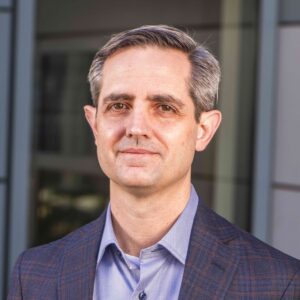
Chris Spitzer, AQT’s quantum research program manager, described the benefits of the partnership to both teams: “Because we have a completely open system at AQT, the Super.tech team had full access from the software to the control hardware and to the physical qubits. We were able to give them opportunities to test, validate, and then expand the capabilities of a software package that became Superstaq. This is now a commercial product that we license from them because we find it so useful.”
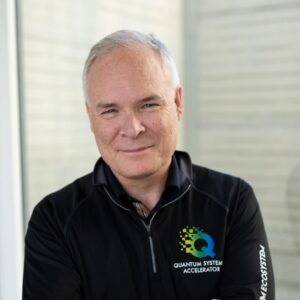
Bert de Jong, QSA’s director, noted that QSA already has many informal relationships with industry. Quantum companies have benefited from QSA’s extensive research network and ongoing collaborations, utilizing the expertise, feedback, and techniques shared by QSA partners to enhance their processes and advance their research. Additionally, QSA principal investigators have co-founded quantum companies: IonQ, QuEra, and Atlantic Quantum.
QSA is planning on significantly expanding these relationships, to accelerate improvements in quantum applications, and in error correction and controls, among other opportunities.
Said Bert, “For example, we are talking with a number of companies about working with QSA on end-user quantum applications – how to make them work more efficiently and thus make these applications more marketable. We are exploring research partnerships with companies and the Molecular Foundry to better understand the materials needed to make better superconducting chips. It’s very much focused on the manufacturing aspect. We will soon start working with a company on error correction, integrating its capabilities into our QubiC 2.0 open source control system and then demonstrating that capability.”
Workforce Development
In addition to access to quantum hardware and expertise, the Lab is also contributing to the industry through its workforce development efforts. The Lab is teaching students about quantum computing and providing hands-on experiences for work in the field. For example, QSA, in collaboration with other DOE National Quantum Information Science Research Centers, organizes career fairs and events like the “You Belong in Quantum” series, and, with Sandia National Labs, an annual QCaMP for students and teachers nationwide. It also offers QSA fellowships; in fact, over 50% of QSA alumni occupy prominent science and technical roles in major companies and startups.
AQT also offers internships and research opportunities for high school students, college students, and postdocs to help encourage and prepare them for a career in quantum science. At a 2023 conference, three AQT alumni, Marie Lu, Brad Mitchell, and Alexis Morvan, gave presentations about how AQT provided unique training that prepared them to pursue different opportunities at IBM, Google, and PsiQuantum.
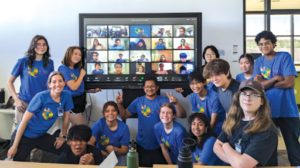
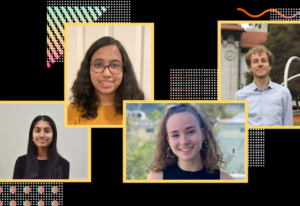
Collaborations with Industry are Critical to the Lab’s Future
Both Bert and Chris expect QSA and AQT’s collaborations with industry to expand significantly in the near future.
According to Chris, “We know that there are more companies out there who can take advantage of a partnership with AQT, and we also hit limits on our own systems where we need a commercial partner to help us address engineering challenges.”
Two examples of such challenges are: quantum-ready components for superconducting quantum computing stacks, and developing high-density wiring that can handle greater numbers of qubits in cryogenic systems. “These solutions aren’t mature yet, so we’re working with partners in a collaborative, creative mode, to develop them,” said Chris. “We test these solutions on our hardware, and they get the feedback they need on how their solutions are working.”
Bert agreed, noting that quantum computing is critical to the future of the Lab in many ways. “Eventually, the science research at Berkeley Lab will be replaced or supplemented at least partially with quantum computing. Quantum computing advances are also important for our user facilities. Understanding the fundamental physics related to quantum mechanics entanglement, and how we can utilize and harness it, is important to what the Molecular Foundry does. And quantum processes are at the center of our light source facilities,” he explained.
“We need to get better at controlling quantum technologies, and we cannot do that by ourselves. The work that needs to be done is extensive, and we need partnerships with many people to really chart a path to using quantum technologies for innovation and discovery,” concluded Bert.
For more information:
Building the Quantum Future, Qubit by Qubit, Berkeley Lab Newscenter, Sept. 30, 2024
The Advanced Quantum Testbed Positions Itself as R&D Hub for the Growing Quantum Computing Startup Ecosystem, AQT website, June 16, 2021

